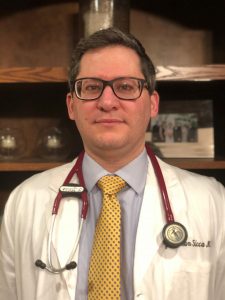BCFMO Diplomate Jonathan Sticca, MD, Explains Why He Became Board Certified in Family Medicine Obstetrics
 The practice of obstetrics has been linked with the specialty of family medicine since the origin of the specialty. For decades in the modern healthcare era, we provided a large percentage of the prenatal care, deliveries, and postpartum care for mothers and their newborns. While obstetrical training is still a mandatory requirement for board certification in family medicine, programs in many areas of the country are seeing delivery numbers dwindle and many residents choosing to not offer obstetrical care after training.
The practice of obstetrics has been linked with the specialty of family medicine since the origin of the specialty. For decades in the modern healthcare era, we provided a large percentage of the prenatal care, deliveries, and postpartum care for mothers and their newborns. While obstetrical training is still a mandatory requirement for board certification in family medicine, programs in many areas of the country are seeing delivery numbers dwindle and many residents choosing to not offer obstetrical care after training.
Certainly, there are parts of the country where the community does not require primary care physicians to provide this service. However, there is a significant portion of the country, particularly much of rural America, where communities are in dire need of providers well-trained in obstetrical care. Women are often required to travel distances of 75-100 miles or more to see their obstetricians. These communities are caught in a literal “catch-22” when it comes to having access to obstetrical services. Their local providers lack either training and/or support to provide obstetrical care, and yet their patient volume isn’t high enough to support a full-time OB/GYN. The result is a drastic shortage of access to quality obstetrical care for women in rural communities.
These were the reasons I chose to pursue extra training in obstetrics after residency, and to obtain board certification in family medicine obstetrics from the American Board of Physician Specialties® (ABPS). I first learned of the ABPS and the certification offered through its Member Board, the Board of Certification in Family Medicine Obstetrics (BCFMO), during the beginning months of my fellowship. No one I worked with at the time had heard of the certification process, so I looked into it and decided it would be a worthwhile endeavor.
Certification through the BCFMO offers a unique opportunity to primary care providers. Those who pursue added training in obstetrics still struggle with credentialing, even in areas of critical need. With no unified process for verification of training offered by other boards, many providers must endure long and drawn-out processes to verify their competency and capabilities. This is what drew me to BCFMO certification. The certification process is specific, deliberate, and rigorous. It provides two clear-cut tracks for providers to gain certification: either via fellowship training or copious clinical experience. It requires a definite minimum number of both cesarean and vaginal deliveries to become certified, and also requires physicians currently credentialed in operative obstetrics to attest to their competency. Combined with a written and oral board exam, these requirements guarantee that physicians who obtain BCFMO certification have done the work to gain the cognitive and technical abilities required to provide obstetrical care. Those who become certified in family medicine obstetrics are willing to stand before their peers and be tested in order to ensure their level of competency.
Access to healthcare has improved greatly in this country over the last decade. However, much work still needs to be done. This is no more apparent than in the lack of access to local obstetrical care in many rural communities. Having just obtained BCFMO certification myself, I would recommend the process to any primary care physician who wants to provide obstetrical care to their patients. It provides a solid path to verify training and competency, and gains them entry to a community of like-minded individuals who are committed to promoting the practice of obstetrics in family medicine and ensuring that we provide the best care possible.










